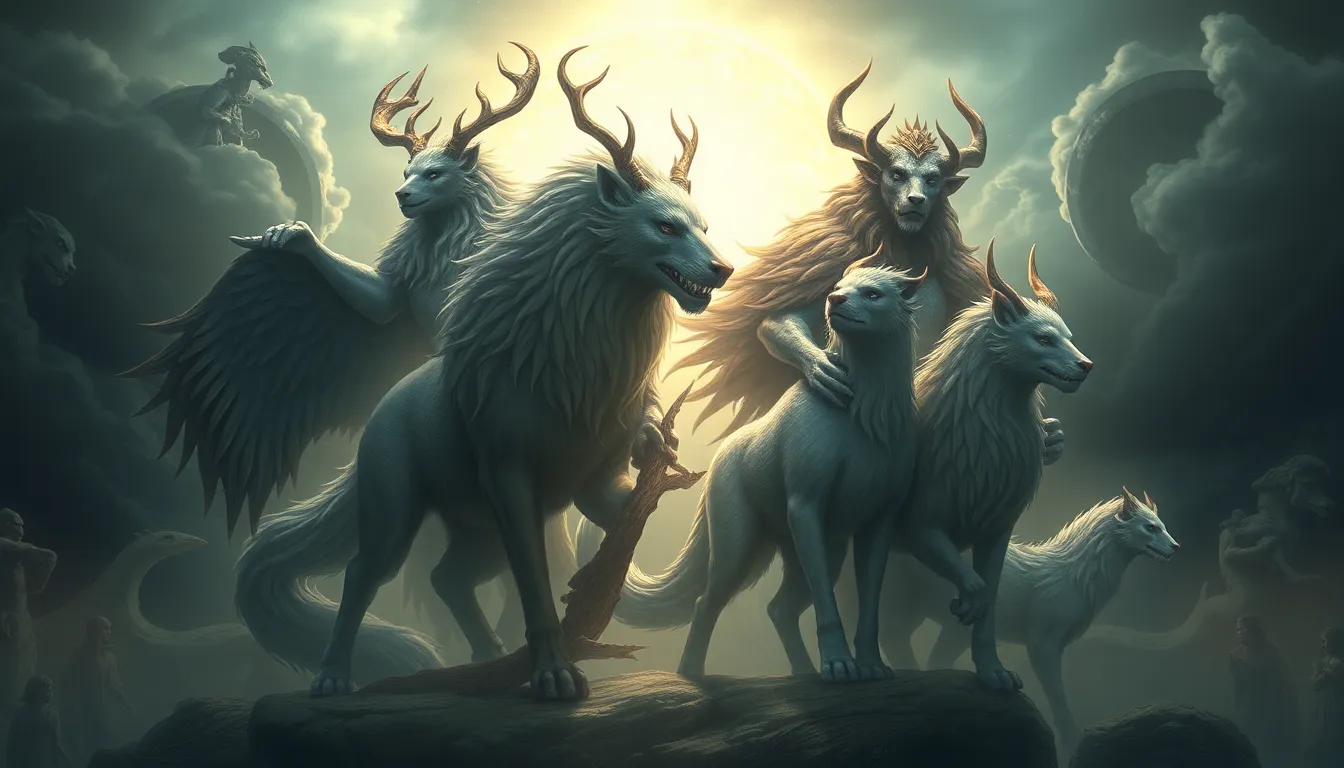Animal Guardians in Mythology: Protectors of the Spirit World
Introduction to Animal Guardians in Mythology
Animal guardians are mythological beings or spirits that embody the traits of specific animals, often serving as protectors and guides within various cultural narratives. They symbolize the bond between humans and the animal kingdom, highlighting a deep-seated respect for nature and its inhabitants. Across different mythologies, animal guardians play crucial roles in guiding souls, protecting communities, and maintaining balance in the spirit world.
This exploration seeks to delve into the significance of animal guardians, examining their roles as protectors of the spirit world, and understanding their enduring impact on human culture and spirituality.
Cultural Context of Animal Guardians
Animal guardians exist in numerous cultures, each with unique beliefs and narratives surrounding these protectors. They often embody the traits and attributes of the animals they represent, reflecting the cultural values and the natural environment of the societies that honor them.
The relationship between humans and animals in mythological narratives is often characterized by mutual respect and interdependence. Many cultures view animals as messengers of the divine, capable of bridging the gap between the physical and spiritual realms. This relationship is further emphasized in spiritual practices where animal guardians symbolize strength, wisdom, and guidance.
- Animal guardians often appear in:
- Rituals and ceremonies
- Folklore and storytelling
- Art and symbolism
Types of Animal Guardians in Mythology
Animal guardians can be categorized based on their natural habitats:
- Terrestrial Guardians: Such as wolves and bears, representing strength and loyalty.
- Celestial Guardians: Including eagles and hawks, often viewed as messengers between the heavens and earth.
- Aquatic Guardians: Such as dolphins and fish, symbolizing intuition and emotional depth.
Specific examples of these guardians can be found across various cultures. For instance:
- The wolf in Native American mythology represents loyalty and courage.
- The eagle in ancient Egyptian culture symbolizes the connection to the divine.
- The dolphin in Greek mythology is seen as a protector of sailors and a guide to the afterlife.
The Role of Animal Guardians in Indigenous Mythologies
Indigenous cultures often have profound connections to animal guardians, viewing them as spiritual guides and protectors. In Native American traditions, animal spirits are integral to understanding one’s path and purpose in life. Legends often illustrate how these guardians offer wisdom and protection to their people.
For example, in the Aboriginal Australian culture, the Rainbow Serpent is a powerful guardian of the land and water, embodying the essence of creation and balance. Stories of animal guardians in these cultures emphasize their roles in:
- Teaching moral lessons
- Guiding tribes through challenges
- Connecting people to the land
Animal Guardians in Eastern Mythology
In Eastern traditions, animal guardians are revered and often associated with spiritual enlightenment. In Chinese mythology, dragons symbolize power, strength, and good fortune. They are seen as protectors of the realm and are often invoked in rituals for prosperity and protection.
Similarly, in Hindu mythology, the elephant-headed god Ganesha serves as a guardian of thresholds and is invoked for guidance and removing obstacles. Tigers in both Hindu and Buddhist traditions represent strength and courage, often linked to fierce protection.
The significance of animal guardians in these cultures extends beyond mere symbolism; they are integral to the spiritual framework that guides adherents toward enlightenment and harmony.
Animal Guardians in Western Mythology
In Western mythology, particularly within Greco-Roman and Celtic traditions, animal guardians take on various forms and attributes. Mythological creatures like griffins, which possess the body of a lion and the head of an eagle, symbolize strength and vigilance while serving as protectors of treasures and sacred spaces.
The phoenix, a symbol of rebirth and regeneration, also serves as a guardian of transformation. These creatures not only protect but also inspire narratives of resilience and renewal. The influence of these guardians is evident in modern interpretations, where they continue to shape our understanding of bravery and protection.
The Psychological Impact of Animal Guardians
The psychological symbolism of animal guardians resonates deeply within the human psyche. They often represent aspects of ourselves we aspire to embody, such as courage, wisdom, and protection. In shamanic practices, animal guardians are invoked as spirit guides, offering comfort and direction during times of uncertainty.
Moreover, dreams featuring animal guardians can serve as powerful messages, reflecting our inner struggles and guiding us toward self-discovery. This psychological connection emphasizes the importance of these guardians in fostering resilience and spiritual growth.
Modern Interpretations and Representations of Animal Guardians
In contemporary literature, film, and art, animal guardians are frequently depicted, reflecting a resurgence of interest in these mythological beings. They appear in various forms—from heroic figures in fantasy novels to spiritual guides in animated films—capturing the imagination of audiences worldwide.
While some representations remain faithful to original mythological meanings, others may distort them for storytelling purposes. However, the core essence of animal guardians as protectors and guides continues to resonate, inviting new generations to explore their significance.
The Spiritual Significance of Animal Guardians Today
In modern spiritual practices, individuals often seek connections with animal guardians for guidance and protection. Many engage in rituals that honor these beings, acknowledging their role in fostering a deeper connection to nature and the spiritual realm.
Furthermore, animal guardians have become symbols in environmental and conservation movements, representing the need to protect our planet and its inhabitants. As spiritual advocates, they remind us of our responsibility to safeguard the natural world.
Conclusion: The Enduring Legacy of Animal Guardians
The enduring legacy of animal guardians in mythology highlights their essential roles as protectors of the spirit world. They embody the intricate relationship between humans and the animal kingdom, serving as guides, teachers, and symbols of strength.
As we continue to explore the depths of mythology and spirituality, the significance of animal guardians remains vital, reminding us of the lessons they impart and the connections they foster between our world and the spirit realm.



